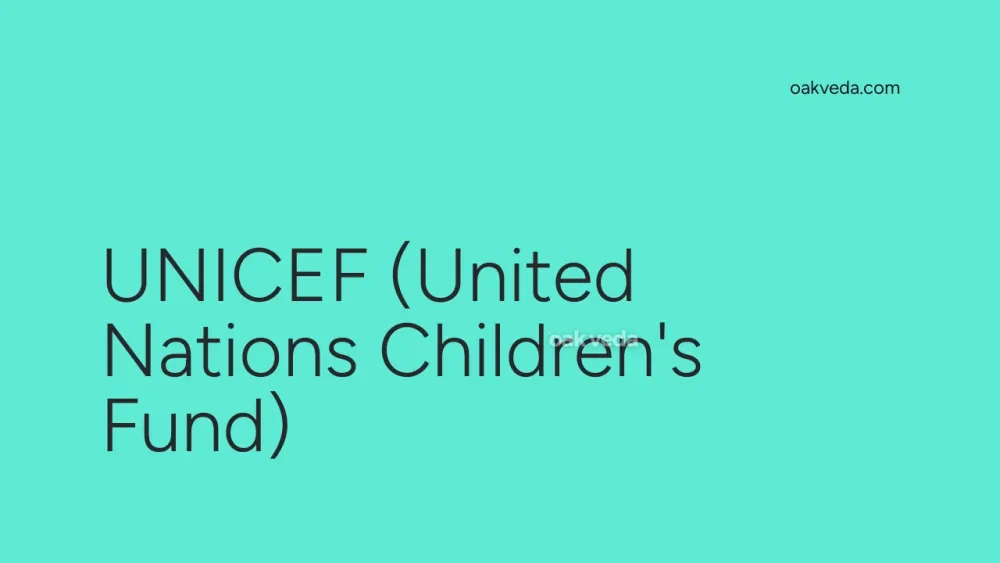
What is the Full Form of UNICEF?
UNICEF is the acronym for the United Nations Children's Fund. Originally established as the United Nations International Children's Emergency Fund, the organization has retained its well-known acronym despite a slight change in its official name.
What is United Nations Children's Fund?
The United Nations Children's Fund is a specialized agency of the United Nations dedicated to improving the lives of children and their families worldwide. UNICEF works in over 190 countries and territories to protect children's rights, help meet their basic needs, and expand their opportunities to reach their full potential.
Origin and Development of UNICEF
UNICEF's history dates back to the aftermath of World War II:
- 1946: Founded on December 11 as the United Nations International Children's Emergency Fund to provide immediate relief to children affected by World War II.
- 1950: Mandate expanded to address long-term needs of children and women in developing countries.
- 1953: Became a permanent part of the United Nations system, changing its name to the United Nations Children's Fund while retaining the UNICEF acronym.
- 1965: Awarded the Nobel Peace Prize for promoting brotherhood among nations.
- Present: Continues to be a leading global organization for children's rights and well-being.
How does UNICEF work?
UNICEF operates through a network of country offices, national committees, and partnerships:
- Country Offices: Implement programs tailored to specific national needs.
- National Committees: Raise funds and awareness in industrialized countries.
- Partnerships: Collaborate with governments, NGOs, and the private sector.
- Emergency Response: Provide rapid assistance in humanitarian crises.
- Advocacy: Influence policies and decision-makers to prioritize children's rights.
Functions of UNICEF
UNICEF's primary functions include:
- Child Protection: Safeguarding children from violence, exploitation, and abuse.
- Education: Ensuring access to quality education for all children.
- Health: Improving maternal and child health through vaccination programs and healthcare initiatives.
- Nutrition: Combating malnutrition and promoting healthy eating habits.
- Water, Sanitation, and Hygiene (WASH): Providing access to clean water and sanitation facilities.
- Emergency Relief: Responding to natural disasters and conflicts to protect affected children.
- Advocacy: Promoting children's rights and influencing global policies.
Applications of UNICEF's Work
UNICEF's efforts have wide-ranging applications:
- Global Health Initiatives: Implementing vaccination campaigns and disease prevention programs.
- Education Systems: Supporting the development of inclusive and quality education systems.
- Child Protection Mechanisms: Establishing systems to prevent and respond to child abuse and exploitation.
- Humanitarian Aid: Providing essential supplies and services in emergency situations.
- Policy Development: Assisting governments in creating child-friendly policies and legislation.
Features of UNICEF
Key features that distinguish UNICEF include:
- Global Reach: Operating in over 190 countries and territories.
- Rights-Based Approach: Focusing on fulfilling the rights of every child.
- Innovation: Utilizing technology and new approaches to solve complex challenges.
- Data Collection: Gathering and analyzing data on children's well-being to inform policies and programs.
- Brand Recognition: Widely recognized and trusted organization for child advocacy.
Benefits of UNICEF's Work
UNICEF's efforts result in numerous benefits:
- Reduced Child Mortality: Saving millions of lives through health interventions.
- Improved Education: Increasing school enrollment and literacy rates.
- Enhanced Child Protection: Reducing child labor, early marriage, and other forms of exploitation.
- Better Nutrition: Decreasing malnutrition rates and promoting healthy growth.
- Increased Access to Clean Water: Improving health outcomes and quality of life.
- Empowerment of Communities: Building local capacity to sustain positive changes.
Limitations or Challenges of UNICEF
Despite its successes, UNICEF faces several challenges:
- Funding Constraints: Reliance on voluntary contributions can limit program scope and sustainability.
- Political Barriers: Navigating complex political situations in some countries.
- Cultural Sensitivities: Adapting programs to diverse cultural contexts while maintaining core principles.
- Reaching Remote Areas: Ensuring services reach the most marginalized and isolated communities.
- Measuring Impact: Quantifying long-term effects of interventions in complex environments.
Future Developments in UNICEF's Work
UNICEF continues to evolve its approach to meet emerging challenges:
- Digital Transformation: Leveraging technology to improve program delivery and data collection.
- Climate Change Focus: Addressing the impact of climate change on children's well-being.
- Mental Health Initiatives: Expanding programs to support children's mental health and well-being.
- Youth Empowerment: Increasing youth participation in decision-making processes.
- Sustainable Development: Aligning efforts with the UN's Sustainable Development Goals.
FAQs on UNICEF Full Form
-
What does UNICEF stand for today? UNICEF's full form is the United Nations Children's Fund.
-
When was UNICEF founded? UNICEF was founded on December 11, 1946.
-
How many countries does UNICEF work in? UNICEF operates in more than 190 countries and territories.
-
Is UNICEF part of the United Nations? Yes, UNICEF is a specialized agency of the United Nations.
-
What is UNICEF's main focus? UNICEF's main focus is to protect children's rights and ensure their well-being worldwide.
By understanding the full form and functions of UNICEF, we can better appreciate the organization's crucial role in improving the lives of children globally. From its origins as an emergency fund to its current status as a leading advocate for children's rights, UNICEF continues to make a significant impact on the world's most vulnerable populations.
You may be interested in:

